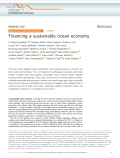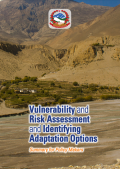
This paper on Green Bond Principles offers guidance on transparency and disclosure in the development of the green bond market. It recommends a clear process and disclosure for issuers, which investors, banks, underwriters, arrangers, placement agents and others may use to understand the characteristics of any given green bond.

The ocean, which regulates climate and supports vital ecosystem services, is crucial to our Earth system and livelihoods. Yet, it is threatened by anthropogenic pressures and climate change.

The Government of Nepal (GoN) recognizes the importance of Vulnerability and Risk assessment (VRA) in adaptation planning and implementation. The main goal of this assessment is to help Nepal’s National Adaptation Plan (NAP) process assess climate-related hazards, vulnerabilities, and risks, as well as identify practical adaptation options at the municipal, sectoral, and provincial levels.

The economic impacts of ghost gear include the forgone catch of target fisheries, risks to navigational safety, delays to shipping and impacts on coastal tourism. Not only does ghost fishing gear continue to capture target species, but it can capture threatened and endangered species too, as well as destroy habitats.
The report from the Science Based Targets initiative (SBTi) takes stock of corporate climate ambition in G7 countries. It assesses the temperature ratings of the leading equity indexes of their markets and frames science-based target setting as the solution to bridge the ambition gap, outlining levers to unlock breakthrough climate mitigation action.
